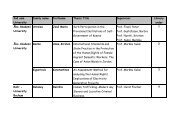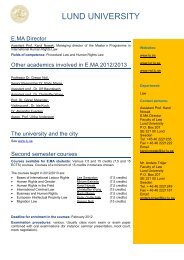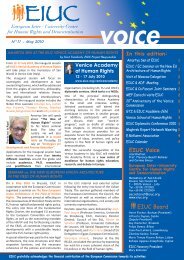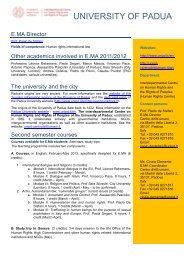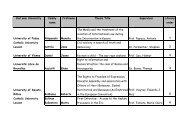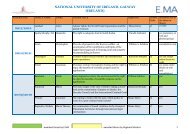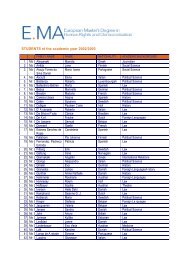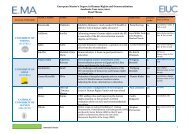study human rights mainstreaming in eu's external relations - EIUC
study human rights mainstreaming in eu's external relations - EIUC
study human rights mainstreaming in eu's external relations - EIUC
Create successful ePaper yourself
Turn your PDF publications into a flip-book with our unique Google optimized e-Paper software.
DG EXPO Policy Department<br />
2 HUMAN RIGHTS IN EU EXTERNAL RELATIONS: LEGAL BASIS,<br />
POLICIES AND INSTRUMENTS 35<br />
After <strong>in</strong>troduc<strong>in</strong>g and elaborat<strong>in</strong>g on the concept of <strong>ma<strong>in</strong>stream<strong>in</strong>g</strong> and present<strong>in</strong>g the UN<br />
experience of <strong>human</strong> <strong>rights</strong> <strong>ma<strong>in</strong>stream<strong>in</strong>g</strong>, this chapter explores the development of<br />
<strong>human</strong> <strong>rights</strong> <strong>ma<strong>in</strong>stream<strong>in</strong>g</strong> with<strong>in</strong> the EU. More specifically, Section A reviews the legal<br />
basis for <strong>human</strong> <strong>rights</strong> as provided for <strong>in</strong> the Treaties. Section B exam<strong>in</strong>es the overall EU<br />
commitments to <strong>ma<strong>in</strong>stream<strong>in</strong>g</strong> <strong>human</strong> <strong>rights</strong> <strong>in</strong> <strong>external</strong> <strong>relations</strong>, start<strong>in</strong>g with the 2001<br />
Commission communication that officially launched the agenda. Section C looks at the<br />
potential tools for <strong>ma<strong>in</strong>stream<strong>in</strong>g</strong>, such as <strong>human</strong> <strong>rights</strong> dialogues and thematic guidel<strong>in</strong>es,<br />
the <strong>human</strong> <strong>rights</strong> clauses and the European Initiative for Democracy and Human Rights.<br />
Section D describes the <strong>in</strong>stitutional organisation put <strong>in</strong> place by the EU to support<br />
<strong>ma<strong>in</strong>stream<strong>in</strong>g</strong>. F<strong>in</strong>ally, <strong>in</strong> Section E a first evaluation is provided of accomplishments and<br />
limitations of the EU <strong>ma<strong>in</strong>stream<strong>in</strong>g</strong> effort, which sets the general context and framework<br />
with<strong>in</strong> which the follow<strong>in</strong>g analyses of specific policy areas and case studies are to be<br />
considered.<br />
2.1 Legal basis<br />
When <strong>in</strong>troduc<strong>in</strong>g the legal basis for <strong>in</strong>clud<strong>in</strong>g <strong>human</strong> <strong>rights</strong> <strong>in</strong> EU <strong>external</strong> <strong>relations</strong> one has<br />
to consider, first of all, that <strong>external</strong> <strong>relations</strong> are predom<strong>in</strong>antly a matter fall<strong>in</strong>g with<strong>in</strong> the<br />
second pillar, which deals with common foreign and security policy. The European Union<br />
promotes respect for <strong>human</strong> <strong>rights</strong> – often <strong>in</strong> conjunction with democracy and the rule of<br />
law – at many levels and <strong>in</strong> many spheres of its <strong>external</strong> <strong>relations</strong>. Its <strong>in</strong>struments of foreign<br />
policy (agreements, dialogues, etc.) and f<strong>in</strong>ancial assistance (<strong>in</strong>clud<strong>in</strong>g the European<br />
Initiative for Democracy and Human Rights) provide a framework for strengthen<strong>in</strong>g<br />
democracy and <strong>human</strong> <strong>rights</strong> <strong>in</strong> the world.<br />
By now, the pursuit of <strong>human</strong> <strong>rights</strong> – often <strong>in</strong> conjunction with democracy and the rule of<br />
law - has become a transversal objective of all of the EU’s <strong>external</strong> activities. From the very<br />
beg<strong>in</strong>n<strong>in</strong>g, the European <strong>in</strong>tegration was based on the wish for peace and freedom. In the<br />
preamble of the 1957 Treaty establish<strong>in</strong>g the European Economic Community (EEC) the<br />
signatories declared to “preserve and strengthen peace and liberty, and to call upon the other<br />
peoples of Europe who share their ideals to jo<strong>in</strong> <strong>in</strong> their efforts.” However, the codification of<br />
these ideals and its extension to EU’s <strong>external</strong> policies began only <strong>in</strong> 1993 with the entry <strong>in</strong>to<br />
force of the Treaty on European Union (TEU). Article 11 TEU set the development and<br />
consolidation of “democracy and the rule of law, and respect for <strong>human</strong> <strong>rights</strong> and<br />
fundamental freedoms” as an objective of the EU’s Common Foreign and Security Policy<br />
(CFSP). The Treaty of the European Communities (TEC) stipulates that the Community policy<br />
<strong>in</strong> the sphere of development cooperation must contribute to develop<strong>in</strong>g and consolidat<strong>in</strong>g<br />
democracy and the rule of law, and the respect of <strong>human</strong> <strong>rights</strong> and fundamental<br />
freedoms 36 . With the Treaty of Nice – concluded <strong>in</strong> December 2000 – these ideals ga<strong>in</strong>ed<br />
35 This chapter is based primarily on contributions by Michele Grigolo and Carmen Marquez Carrasco.<br />
36 Articles 171 and 181 TEC.<br />
26



